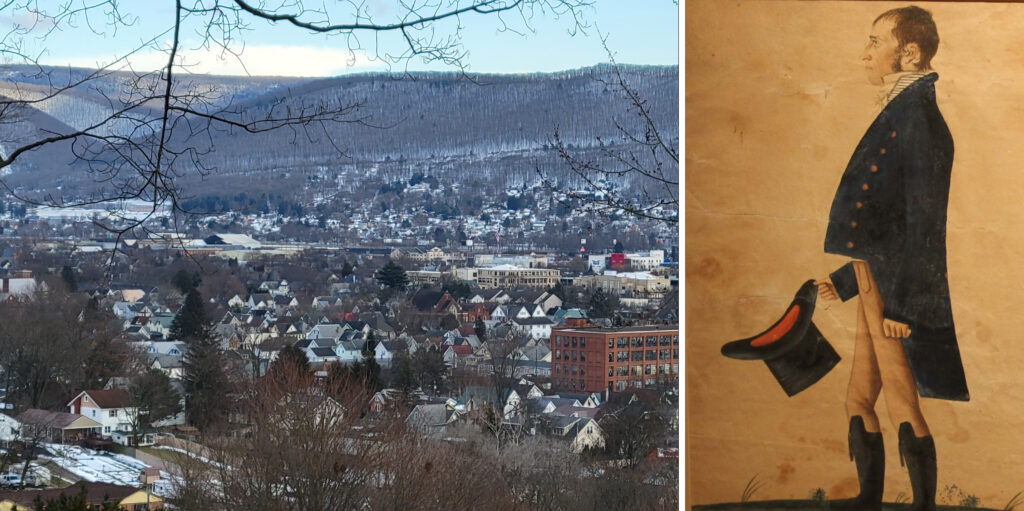
In the late 1790s a young man in his 20s was given a 280-acre tract of land to survey.
The young man, Michael Ross, went on to be credited as one of the founders of Williamsport.
“Ross would be amazed at the development of the small borough he knew to the regional center we now call home. He would most assuredly welcome the efforts of the Society to preserve his heritage and document and protect the history of Williamsport and Lycoming County,” the Thomas Taber Museum website.
Ross is buried in the Williamsport Cemetery on Washington Boulevard with his wife, Ann Corson Ross. His grave is marked with a dark gray marble pillar that says, “Sacred to the Memory of Michael Ross, Esq. proprietor of the borough of Williamsport born July 11, 1759 and died June 20, 1819.”
Ross was not always buried there. He was at one time buried where Williamsport’s first city hall was constructed. Ross’s remains were removed from that plot of land and reinterred in the Washington Boulevard grave.
“Veiled in obscurity”
Ross came to the United States when he was a young boy.
“His origin is veiled in obscurity, the name has been considered Scottish, but his mother was certainly German or Dutch, and came here with her only son, died, and was buried within our city limit,” a writer for the Grit said in the March 20, 1892, issue.
It appears that Ross’s early life was a difficult one.
“Of Michael Ross’s father, nothing whatsoever is known. It has been generally admitted that mother and son were brought from Philadelphia to Muncy Manor (owned by) Samuel Wallis, and it is generally asserted that they were held in limited servitude for a number of years,” the article continued.
In the “History of Lycoming County” that was edited by John Meginness, it was commented that “Who Laurence Ross was is not known, but it is possible that he was the father of Michael Ross, afterwards the founder of Williamsport,” the History said.
The name Laurence Ross appeared in the “History” book as having witnessed a contract between work being done on a house in Muncy by a worker from Philadelphia.
Finding Williamsport
The Grit detailed that Wallis “would (locate) large tracts of land which required much surveying, at which he used young Ross as an assistant until he became sufficiently proficient to conduct expeditions himself.”
At the age of 20, he became a professional surveyor. Samuel Wallis gave him 100 acres of land. He went on, according to Meginness’s book, to acquire “the tract of 280 acres from William Winter, on which the town (Williamsport) was afterwards laid out, Ross found it necessary to locate here.”
Ross found a log house that “had been abandoned by a squatter.” He fixed it up and “occupied (it) for several years, or until about 1800, when he built a two-story brick house, which stood… (near) East Third street. This was the second or third brick house in the new town (of Williamsport).”
Ross soon married Ann, the daughter of Christian Courson (or Corson), a “revolutionary patriot.” It was said that Courson was devoted to the American cause, that he would not eat off of dishes made in England, but only on wooden plates made in America.
The Rosses had their first child, Elizabeth in 1790.
In 1792, he began to survey land and started “up the Loyalsock in September until December.”
“The party was overtaken by a snow storm of two feet in depth, when they started for home. On the way one of the men soon gave out. Whereupon the others l made a chair of their bands and carried him for a while,” the Grit writer described.
However, one of those men “began to fail.” Ross saw that the “situation was getting desperate, as they were all in danger of perishing from cold and exposure.”
Ross then proceeded to stop what he was doing and assist this individual. This second man who was failing was able to recover.
“They started again and all got out safe,” the Grit said. When he returned home, Ross discovered that his daughter Margaret was born.
In 1795, his son William was born, followed by another son, John in 1797 and finally, Anna in 1802.
Forming a government
In 1795, Lycoming County held its first election for sheriff, commissioner and state representatives. Many in Williamsport were anxious to make it the county seat, as opposed to Jaysburg.
“William Hepburn manifested the deepest interest in the scheme and urged Michael Ross to have a town laid out as speedily as possible,” Meginness wrote in his book.
It added, “Ross did not delay a moment. He employed William Ellis and Joseph Williams to lay out the town in 1795.”
A Grit article from, June 24, 1906, expounded that “the town was laid out in regular form, on advice of William Hepburn, and contained 302 lots, with streets and alleys crossing at right angles.”
As for the name Williamsport, Meginess’s book said that Ross believed in the “navigation of the river, so that he naturally expected to see his town become a United States port of entry, and this sentiment was voiced in the familiar name given the village, ‘the Port,’ its earliest recorded name; and it may be here stated that for years after the prefix William was used, the name was written William’s Port, as two words and with capitals.”
A variety of sources said Ross named it for his oldest son, others point to Hepburn’s first name as William, while still others say the “William” came from the previously mentioned William Ellis and Joseph Williams.
The Ross legacy
However, as life progressed for Ross, his family met with many tragedies. His wife Ann, died at 55 in July 1818. His oldest son, William, died at 24 in December of that year. Ross died in June of 1819. Elizabeth died at the age of 37 in 1828 and his second son, John, also died at the age of 37 in 1833.
Even in death, Ross was unable to rest in peace. By the mid-1850s, the borough hall would be laid out on Pine Street on what was called Ross Park.
The 1892 Grit article detailed how Ross, his wife and “their sons were buried in the middle of the Pine street burying ground, where they remained until the desecration of that spot, when the remains were removed to the Williamsport cemetery, where they now lie beneath appropriate markers.”
His daughter, Margaret, also known as Peggy, had a unique relationship with Ross.
“Ross objected to the attention being paid his daughter Peggy by James H. Huling, and asked her if she intended to marry him, and when she said she did, her father replied by saying that he would give her a wedding but would not see them married,” a writer for the 1892 Grit article said.
Peggy Ross did marry Huling and she lived until she was 80 when she died brutally in 1872. The July 26th, 1872 issue of the Daily Lycoming Gazette and West Branch Bulletin detailed a “horrible accident.” Peggy Ross Huling attempted to cross the railroad tracks on Market Street as “the Elmira mail train going west at 6:20 was about to pass.”
As she tried to cross the track, she “stumbled and fell” on the tracks with “the locomotive next instant striking her.” By the time the train had stopped “at least one car had passed over her body.” It was described that the train car had almost cut “her in two.”
She was laid to rest with her family on Washington Boulevard.
The Grit article from 1892 said Ross “cherished high expectations for his town, and devised various schemes for gaining success, which indicated remarkable shrewdness and foresight, but be paid too dearly for the influence of his friends and the subjection of his rivals, so that the many disappointments and perplexities which beset him, combined to render his last days unprofitable, and through excessive drink drove him to a premature grave.”




